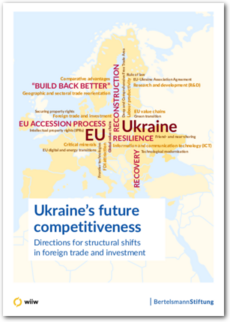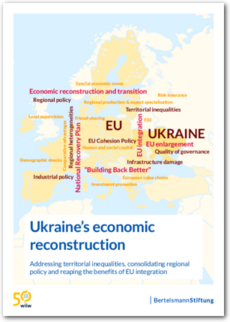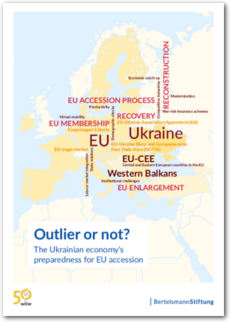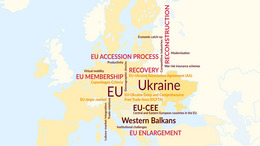In December 2023, the European Council made a historic decision to open accession negotiations with Ukraine. In doing so, it underlined that enlargement is a geo-strategic investment in peace, security, stability and prosperity as well as a key way to reduce disparities among European countries while improving the economic and social conditions of their citizens.
The latest joint Rapid Damage and Needs Assessment (RDNA3) estimates that the reconstruction and recovery of Ukraine will cost $486 billion over the next decade (as of 31 December 2023). In addition to defending Ukraine’s sovereignty, it is important to work on formulating ways in which the Ukrainian economy can resist.
A vital role in these efforts will be played by FDI and increasing exports, which bring hard currency into Ukraine’s struggling economy. For this, the Ukrainian government is “creating conditions to attract private investments, which will accelerate the reconstruction process and transform our country on its path to the EU,” in the words of Denys Shmyhal, the prime minister of Ukraine.
Six industries are crucial for Ukraine’s recovery and successful EU integration
Uncertainty over the end of the war makes both processes even more complex, but it also underlines the need to integrate and reinforce them as part of the shared focus on a transformative modernization. Reconstruction has been based on the principle of “build back better” and a “green” transition from the outset, and its goals have been to ensure independence from Russian resources, to “leapfrog”, and to develop more technologically advanced sectors with higher value added instead of just rebuilding what has been destroyed.
At this critical juncture, our new study offers an analysis of industries that can bolster the Ukrainian economy: renewable energy; critical minerals; the manufacture of metals; the manufacture of machines as well as electrical and transport equipment; agro-food; and IT. Our joint study with the Vienna Institute for International Economic Studies (wiiw) not only maps out the critical areas for investment but also suggests policies that could fortify Ukraine’s economic position with a dual focus on immediate strategic shifts and long-term competitiveness.
To give up on economic resilience and growth would be giving in to Russian aggression
In June 2024, Germany will be co-hosting the Ukraine Recovery Conference, continuing a series of high-level political events dedicated to fostering Ukraine’s recovery. The URC2024 plans to uphold the spirit of Ukrainian reform progress “to mobilise continued international support for [the] recovery, reconstruction, reform and modernization of Ukraine”, with the ultimate goal to create “attractive conditions for businesses to unlock the private-sector investments”.
Ukraine will need to have an internationally competitive economy that can thrive in both the EU and global markets. While the EU has adopted the Ukraine Facility to provide financial support for transformative rebuilding and key reforms between now and 2027, mobilizing private investment will be vital to meet Ukraine’s needs.
Future vision: Ukraine as a strategic partner contributing to the EU’s sovereignty
Ukraine has much inherent potential to adopt frontier technologies and green economic policies, and its industries have already made some key adjustments. These factors, together with the innovative spirit of its people, mean that Ukraine does not have to lag behind in its economic development. From an EU perspective and in light of future-oriented economic resilience, investment and trade with like-minded partners will be key. Indeed, the bloc has a self-interest in Ukraine’s economic advancement and should take the lead in efforts to unlock its industrial potential.
For Ukraine, the EU membership perspective is crucial, because its greatest asset is its people, who will need to decide of their own free will to stay in or return to Ukraine to take an active part in recovery and making their nation’s path towards EU membership a success.
Now is the time to lay the groundwork for Ukraine’s successful EU accession
The EU is itself undergoing profound transformations in its efforts to play a strong and assertive role in the changed global context. The accession path will require Ukraine to undertake recovery and reconstruction within a framework of more extensive alignment with the EU than previous joiners, for example in respect of the green and digital transformation.
In her 2023 State of the Union address, European Commission President von der Leyen emphasized that “the next enlargement must also be a catalyst for progress”. This perspective aligns with the technological, innovation and resources potential that Ukraine can contribute.
Our study is geared towards policymakers and anyone interested in the future of Ukraine and its role in Europe. It is the third and last in a series of three studies in cooperation with the Vienna Institute for International Economic Studies (wiiw), including Ukraine’s economic reconstruction: Addressing territorial inequalities, consolidating regional policy and reaping the benefits of EU integration and Outlier or not? The Ukrainian economy’s preparedness for EU accession.
![[Translate to English:] Titelbild der Studie: Ukraine’s future competitiveness. Karte von Europa mit zur Studie inhaltlich passenden Schlagwörtern](/fileadmin/files/_processed_/3/1/csm_AdobeStock_143550481_KONZERN_ST-EZ_ID2173_Ukraine2_f526507180.jpg)




![[Translate to English:] Die Flaggen der Ukraine und der Europäischen Union flattern im Wind am blauen Himmel](/fileadmin/files/_processed_/5/b/csm_AdobeStock_504331922_KONZERN_ST-EZ_6e1eaed30a.jpg)

![[Translate to English:] Weltkarte](/fileadmin/files/_processed_/2/e/csm_AdobeStock_143550481_KONZERN_ST-EZ_ID-1729_Titel_Interconnectivity_2023_02_535bd86918.jpg)


